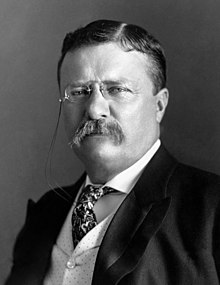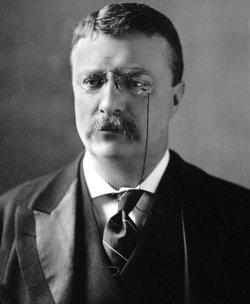A New York governor who became the 26th U.S. president, Theodore Roosevelt is remembered for his foreign policy, corporate reforms and ecological preservation.

Who Was Theodore Roosevelt?
Theodore Roosevelt was governor of New York before becoming U.S. vice president. At age 42, Roosevelt became the youngest man to assume the U.S. presidency after President William McKinley was assassinated in 1901. He won a second term in 1904. Known for his anti-monopoly policies and ecological conservationism, Roosevelt won the Nobel Peace Prize for his part in ending the Russo-Japanese War.
Early Life
Theodore “Teddy” Roosevelt was born on October 27, 1858, in New York City, to Theodore “Thee” Roosevelt Sr., of Dutch heritage, and Martha “Mittie” Bulloch, a Southern belle rumored to have been a prototype for the Gone with the Wind character Scarlett O’Hara. His family owned a successful plate-glass import business.
As a young boy, Roosevelt — or “Teedie,” as he was known to his family members (he wasn’t fond of the nickname “Teddy”) — spent a lot of time inside his family’s handsome brownstone, homeschooled due to his illnesses and asthma. This gave him the opportunity to nurse his passion for animal life, but by his teens, with the encouragement of his father, whom he revered, Roosevelt developed a rigorous physical routine that included weightlifting and boxing. When his father died during his second year at Harvard College, Roosevelt channeled his grief into working even harder. After graduating magna cum laude in 1880, he enrolled at Columbia Law School and got married to Alice Hathaway Lee of Massachusetts.
U.S. Presidency

Roosevelt’s progressive policies in New York ran him afoul of his own party, so Republican Party bosses plotted to quiet him by naming him on the McKinley ticket in the thankless post of vice president. However, after his re-election in 1901, President McKinley was assassinated. At age 42, Roosevelt became the youngest man to assume the U.S. presidency.
Roosevelt’s presidency is distinguished by his dedication to prosecuting monopolies under the Sherman Antitrust Act. Out of this commitment grew a benchmark of his first term, the “Square Deal” — a domestic program that embraced reform of the American workplace, government regulation of industry and consumer protection, with the overall aim of helping all classes of people. Roosevelt’s charismatic personality and impassioned combination of pounding fists and emphatic rhetoric undoubtedly helped in pushing his agenda.
In 1905, Roosevelt walked his niece, Eleanor Roosevelt, down the aisle (Theodore’s brother, Elliott, had died in 1894) during the wedding ceremony for Eleanor and her fifth cousin once removed, Franklin D. Roosevelt.
Around the same time, believing that America needed to take its rightful place on the world stage, Roosevelt initiated a massive public relations effort. Engaging his unofficial policy of “Speak softly and carry a big stick,” Roosevelt bulked up the U.S. Navy and created the “Great White Fleet,” sending it on a world tour as a testament to U.S. military power. He also helped expedite the completion of the Panama Canal by providing tacit approval of the Panama revolution with funds and a naval blockade preventing Columbian troops from landing in Panama. President Roosevelt was awarded the Nobel Peace Prize in 1906 for his role in negotiating the end of the Russo-Japanese War. Roosevelt believed that if Japan had devastated Russia, it would lead to an imbalance of power in the Pacific, one that the United States would eventually have to realign, but at a disastrous cost.
Roosevelt’s international stance was the impetus for the Roosevelt Corollary to the Monroe Doctrine, which claims the right to intervene in cases of wrongdoing by a Latin American or any other nation, though some critics assert that the doctrine designates the United States as the “policeman” of the western world.
Death and Legacy
When Roosevelt was a young boy, doctors discovered that he had a weak heart, and advised him to get a desk job and not strain himself. However, he lived a more active life than most. Outside of his political career, Roosevelt published more than 25 books about a range of subjects, including history, biology, geography and philosophy. He also published a biography and an autobiography, including The Winning of the West, comprised of four volumes.
Roosevelt died in his sleep on January 6, 1919, at his Long Island estate, Sagamore Hill, after suffering a coronary embolism. He was 60 years old. He was buried at the Youngs Memorial Cemetery in New York.
Although he was denied the Medal of Honor for the Battle of San Juan Heights, Roosevelt posthumously received the honor — the highest award for military service in the United States — more than 100 years later, on January 16, 2001, Roosevelt was the first president to receive the Medal of Honor, conferred by President Bill Clinton.